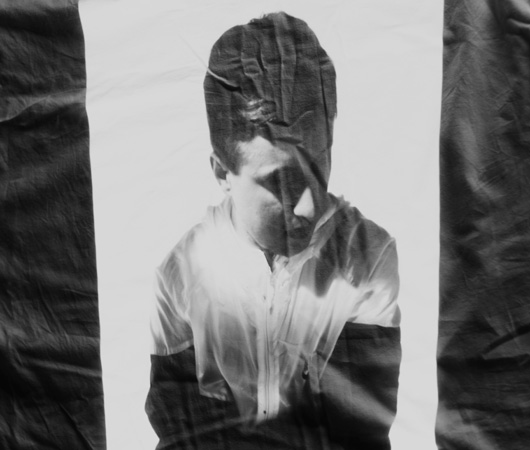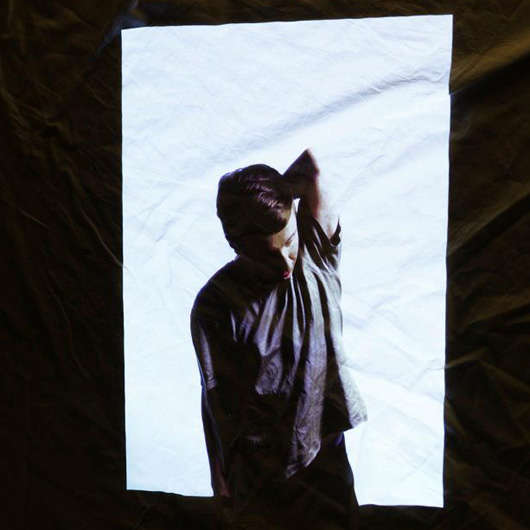Holy Other: Underneath the Hood
“I want it to just be over,” says Holy Other. The shadowy UK artist is […]

Holy Other: Underneath the Hood
“I want it to just be over,” says Holy Other. The shadowy UK artist is […]

“I want it to just be over,” says Holy Other. The shadowy UK artist is referring the mystery surrounding his true identity, which he has somehow managed to keep secret. It hasn’t been an easy task, especially once last year’s With U EP was met with resounding acclaim. (For those keeping score at home, XLR8R tabbed it as the Best Release of 2011.) This week, he’s followed it up with another impressive effort for the Tri Angle imprint, Held, his debut full-length. Once again showcasing his ability to combine dark, lurching melodies with affecting pitched vocal snippets and hip-hop-flavored percussion, the record is already garnering its share of accolades. This flash of attention will only intensify as he embarks on heavy touring schedule in the months ahead, all but ensuring that Holy Other’s days as an anonymous beatmaker are numbered… and he knows it.
“It’s kind of a distraction now,” he says of the constant questions surrounding his identity. “It’s also pretty untenable for the future. It’s really difficult to take something on the road and be touring, and be this anonymous, elusive person when you’re present.” In fairness, although Holy Other’s efforts to separate his identity from his art may seem like some kind of postmodern gimmick, his decision to do so actually stems from a much simpler fact: he’s shy. “I really didn’t want people to see a panicking expression,” he says. “It’s kind of off-putting for people to see someone sweating over their equipment and looking really frightened.” As such, he’s always performed with a black hood, in an effort to create a live-performance scenario for himself that feels safe. He explains, “Right now, it’s kind of like performing in my bedroom, with a little bit of crowd noise.”

Interestingly enough, it seems that the best way for Holy Other to deflate the interest in his identity is to simply reveal himself. “It’s about time to give up on the anonymity aspect of things,” he laments. “[It’s] sad, but it’s just become too difficult.” That said, he’s not looking to build anticipation for some kind of highly publicized unveiling. “I just don’t want to make an event out of it,” he says emphatically. Instead, Holy Other simply plans to start performing without the hood, a relatively small change he plans to enact with little fanfare. “I just feel like I have to do it,” he says. “I just have to get it out of the way and get used to it.” He adds, “Hopefully, if I just stop doing it now, then there won’t be that much of an issue.”
Clearly, Holy Other isn’t an artist who seeks the limelight. When asked to describe his ideal relationship with his audience, he says, “The least hands on possible. I want the music to be read and interpreted, rather than there being some sort of overarching artist figure.” And even when his music is interpreted, he doesn’t necessarily want to look over what people have to say about it. He explains, “I rarely [read reviews or online comments], only because whenever I stumble across something that’s in any way negative, I freak out.”
With U EP

Luckily for him, negative comments surrounding the music of Holy Other are generally hard to come by. The success of With U was unexpected, even for him. “I had zero expectations with the EP,” he explains. “I just wanted to create a collection of tracks that I was happy with, that I thought flowed well.” Recorded over a long period of time in a variety of different locales, Holy Other had the freedom to truly fine tune With U, not to mention the luxury of creating it in a pressure-free environment. When it came time to make Held, things were different, and Holy Other faced some concrete expectations—including a few of his own—as he began work on his first album. Nevertheless, following what he describes as an initial struggle, he speaks of the LP’s creation process in relatively painless terms, stating that it eventually came together rather quickly. “It wasn’t like I had a massive backlog of demos that I was reworking,” he says. “It was all fresh stuff that I tried to make around the same time.”
A big part of what smoothed the album’s formation was that Holy Other crafted an entire narrative ahead of time. Although he doesn’t want to explicitly spell out what the album is trying to say, he does admit that the Holy Other project has so far been focused on creating what he calls “relationship music,” and that Held is a further exploration of that theme. “The EP is explicitly a breakup record,” he reveals. “It isn’t about the lighter sides of a relationship. The album, on the other hand, is [about] the lighter and the dark sides of a relationship. It’s supposed to be confined, claustrophobic at times, peaceful at times as well.” Granted, plenty of artists are making music about love and relationships, but Holy Other’s planning and preparation for Held sets him apart. “I wasn’t really starting to write the songs with the rhythm in mind, but with the ideas behind the songs in mind,” he says. “I have more of a focus on the track titles, before I start really writing the melodies, which is a reverse way of writing.” In short, the track titles were all decided upon ahead of time and all of them have a definite meaning.

Perhaps it was this intense planning that allowed Holy Other to create what he refers to as an “emotional spread” on Held. Acknowledging that the With U EP was “constantly crushing,” he says that the album, “is mostly about restraint. It does burst over the top at times… but this is a lot more sparse.” Make no mistake, Held is not some kind of radical departure for Holy Other, particularly in terms of its sound palette. That said, it’s peppered with warm tones and tender moments that didn’t appear on With U, and also includes fewer nods to house music. The disappearance of house tropes is especially interesting; when Holy Other spoke with XLR8R last fall, he expressed an interest in exploring clubbier sounds. That desire was genuine, but, as he says, “what in fact happened was kind of the reverse. It became more about how enclosed I felt at the time. I didn’t feel like putting too much house into it and having a dance structure.”
What Held does have, on the other hand, is a more human element, most notably via its vocals. While there may not be anything resembling a traditional pop vocal, Holy Other does assemble a pastiche of pitched voices—both recorded bits of his own and samples of other artists—and occasionally arrange them into meaningful phrases. For instance, “U Now” says “I will only love you,” and “In Difference” is littered with an emotive refrain of “Be my heart.” These lines aren’t coincidental. “When there’s a lyric that I’ve left clear, it is intentional,” he says. “It’s not just a purely aesthetic thing. I feel like it has an importance if I’ve left in a phrase or if I’ve chopped it up to make a phrase.”
Held

Without question, Holy Other is an incredibly thoughtful artist, and so far, his methods have worked out spendidly. Nonetheless, they’re about to be put the the test in a major way. After wrapping up a UK tour this week, he’ll be heading across the Atlantic for his first-ever dates in the US, with the intention of performing them hoodless. For most artists, that alone would be daunting, but Holy Other has compounded the situation by accepting a slot opening for Amon Tobin, who will be trotting out the latest iteration of his ISAM Live show for huge audiences around North America. Holy Other admits that the prospect of performing in front of these large crowds is “terrifying,” but intends to go through with it anyways. Smartly, he’s decided that trying to compete with the absolute spectacle of Amon Tobin’s show would be the wrong way to go. “Obviously, I can’t compete with what’s going on on stage,” he says with a laugh. “That would be totally the wrong approach. I’ve tried to create a restrained show that’s more accessible as well.” After all, he doesn’t want to be the cliché opening act who overstays his welcome. “I’ve been to plenty of shows where I really wanted to see the headliner, and the support I just didn’t want to see,” he says. “I don’t want to make people suffer through my sadness.”
He’s quick to joke about how dark and dire his music is, but Holy Other is honestly rather affable and forthcoming in conversation. He knows that his choice to linger in the background has led to a certain perception about his personality, and it’s not a characterization that he relishes. “I don’t want to [just] be the person on stage, wearing a hood,” he says. “When people say [that I’m] creepy, it’s missing the point of what I intended by it.” He elaborates, “People associate the anonymity with the music, but the music isn’t really about the anonymity. The music is the music. It’s supposed to not be tainted by the fact that there is an artist involved. Ideally, I just don’t want to be there.”


